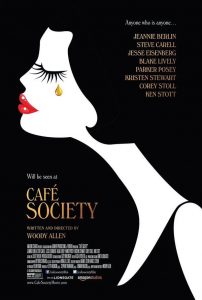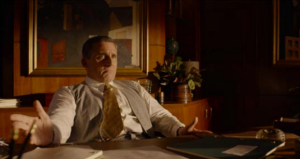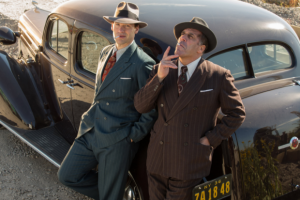
Despite the film being named after it, the titular Café Society isn’t actually what the film is about. The Café Society itself is actually more of a hindrance than an asset. It is a New York nightclub that belongs to two brothers, Bobby (Jesse Eisenberg) and Ben (Corey Stoll). The former is our protagonist, a lovelorn Woody Allen avatar back home from a detour in Los Angeles. The latter is a gangster in search for his own film. More on him later.
The film revolves around Bobby and his love triangle with the ravishing Vonnie (Kristen Stewart) and his self-absorbed uncle, Phil Stern (Steve Carell). Both men fall head over heels in love with the well-spoken secretary and she loves them both back. The problem is she can’t choose which one her heart belongs to. She’s been with Phil for a year, having just celebrated their paper anniversary. A paper anniversary because she is his mistress and their love affair has been reserved to letters and secret rendezvous. He does truly love her, despite his self-centeredness, and finally leaves his wife for her.

Then there’s Bobby, an awkwardly confident optimist who loves her as passionately as one can love someone. His infatuation is almost of the puppy dog variety, following her around and hanging on her every word. Even when he thinks she is taken (by a journalist named Doug), he is persistent in winning her heart, showering her with compliments and flights of fancy. He does eventually win her over, but Phil comes crawling back into the picture and snatches her way from his nephew.
This is no traditional love triangle. There are no fist fights or verbal altercations between the two men, only stern conversations. Both give Vonnie her chance to choose, trying their best to persuade her but not demonize her decision. She chooses Phil rather quickly, halfway through the film and shortly after her love affair with Bobby, for reasons that make sense. She and Phil have been together for a year, whereas her romance with Bobby is still fresh. Does she risk hurting both men by discovering her feelings for Bobby are temporary and is broken off quickly, or stick with the man she initially fell in love with. I can’t say I blame her, despite Bobby being the more engaging personality (and so he should, considering he’s a younger version of Woody Allen written by the man himself).

Bobby hightails it back to New York to help run a nightclub with his brother and this is where the film falls apart. It is now less a film about a love triangle and more a film about family turmoil. There’s no denying the love triangle is still the main course, but the appetizer of Ben’s criminal ways is served up once too often. Woody Allen gets lost in it, even including a meaningless subplot about the sister going behind her nebbish husband’s back to recruit her brother to take care of a confrontational neighbor. It’s meant to show the dangerous unpredictability of Ben’s lifestyle, but simply stating that he’s a gangster does that just fine.
The whole purpose behind Ben’s thuggish escapades is to highlight Bobby’s detachment from life. Without Vonnie, he drifts through life without a care in the world. He is nonplussed by his brother’s thuggish activities and his marriage to the beautiful Veronica (Blake Lively) is aimless. Of course he would fall in love to a woman who shares the same name with his first (and still true) love. Not that I can complain, as I too have a particular name that seems to follow me around like a curse. This is all purposeful, but oh so very tiring.

I found myself impatiently sitting around waiting for the return of Vonnie. When she does return I perked up, just as Bobby did. I realize this is the point, to make the audience feel as driftless without her as Bobby does. Being purposely capricious doesn’t make it any less aggravating for the viewer. It’s a risk Woody Allen takes and it unfortunately doesn’t pay off.
This isn’t to say the first half of the film is without fault. It too gets lost, this time in the backdrop of 1930s Hollywood. Starlets are namedropped at the flick of a wrist, all to encapsulate the smugness of it all. It is to highlight the contrast between Phil and his nephew, the former self-centered and the latter naively idealistic. It is to show how the lifestyle can suck the innocence out of the most buoyant of personalities, in this case the down-to-Earth Vonnie who slowly morphs into a snobbish narcissist. It too is on-the-nose to a fault, but I was more forgiving due to my infatuation with the three lovers.

All three performances are fantastic! Woody Allen has spent years trying to find his surrogate and he’s finally found him in Jesse Eisenberg. The young actor captures the stilted awkwardness of Woody Allen to a tee, most notably in a scene where he has a personal conflict over whether or not to engage with a prostitute. Steve Carell is pitch perfect as his counterpart, a self-important Hollywood producer with only his best intentions in mind. He tricks those around him, and even the audience, into thinking he has a heart, but the dead-eyed stare he gives Bobby at the Café Society shows his true colors. With Vonnie in his arm, he stares a hole through Bobby, telling him he’s won only with his eyes and grin. It’s master class acting! And there’s Kristen Stewart, an actress I’ve always seen potential in, but one I’ve admittedly been giving up on. Here she wins me back, effortlessly playing the irresistible Vonnie. No longer is she one-note and devoid of life, but intelligent and exuberant. It’s amazing how endearing she can be when given a character written with such life. Good on Woody Allen for bringing out her true talent!
And yet, despite my admiration for the three lovers, I found myself wanting more out of “Café Society.” I left feeling unfulfilled, most certainly the point, but nonetheless slightly disappointing. Maybe I was too enamored with the three leads that the story being told fell by the wayside. Once the second half kicked in, I found my interest waning. I cared not for the Café Society itself or the family turmoil encased within. I even found myself slightly annoyed by Woody’s fascination with Jewish humor and peppy dialogue, a staple of his. I was willing to forgive all of this in return for the enchantment of the love triangle, and I even found myself praising the rather cold finale. By then, it was too little too late.
Final Rating: B-
